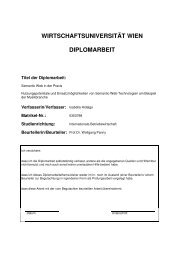Wirtschaftsuniversität Wien Magisterarbeit - SemanticLab
Wirtschaftsuniversität Wien Magisterarbeit - SemanticLab
Wirtschaftsuniversität Wien Magisterarbeit - SemanticLab
You also want an ePaper? Increase the reach of your titles
YUMPU automatically turns print PDFs into web optimized ePapers that Google loves.
is different from the one available at “ibm.com/w3c/p3p.xml”, the reference file at<br />
“www.ibm.com/w3c/p3p.xml” links to non-existing P3P policies at lenovo.com.<br />
• microsoft.com: Microsoft has a valid P3P reference file in place which links to a<br />
P3P policy which can be accessed. However, the P3P policy is not well formed.<br />
According to P3P v1.1, each policy must have a POLICIES-element which is the<br />
root-element of every P3P policy. Unfortunately, this POLICIES-element is missing.<br />
The author contacted Microsoft in October 2008 about this issue and received<br />
the answer that the message will be forwarded “ to the appropriate group for further<br />
follow up”(cp. Appendix B) - at the time of writing in February 2009 however,<br />
the policy still was not fixed. The P3P policy at amazon.com suffers from the same<br />
issue and the author also contacted amazon.com’s customer service and received<br />
an answer which could perceived almost ironically: “Due to the competitive nature<br />
of our business, our policy is not to give out information on the inner workings of<br />
our company” (cp. Appendix B).<br />
As“forgetting” the POLICIES-element seems to be a common issue, it was decided to<br />
implement an option in Webprivacy’s settings to ignore this problem. However, this<br />
option is not activated by default and the author does not recommend to use it as the<br />
P3P standard explicitly states that “user agents MUST NOT locally modify a P3P<br />
policy or policy reference file in order to make it conform to the XML schema” [W3Ca,<br />
Chapter 2.4.4]. What is more, it can be questioned if the authors of the P3P policies<br />
at this websites created an otherwise valid policy (amazon.com’s policy for example still<br />
would be not valid as it lacks almost all basic elements).<br />
The last general issue concerns Firefox itself. Every extension which wants to react to<br />
a website being loaded (such as displaying an icon in a toolbar) needs a way to find out<br />
when a new website has been opened and finished loading. JavaScript offers so called<br />
“event listeners” which fire off a signal which can be traced by extensions. However,<br />
opening a website in a browser window fires off up to several dozens of these events as<br />
iframes, external resources (such as flash-movies) and even the favicon fires off such an<br />
event. That means that an extension which wants to react to websites being loaded<br />
(and tabs switched) on the one hand has to find a way not to start too early with its<br />
operations and on the other hand only to start its routines once per website. This sounds<br />
trivial, but for developing an extension it is not.<br />
6.3.4. Evaluation of the developed add-on<br />
As with the other extensions and plugins in this thesis, Webprivacy will also be evaluated<br />
using the criteria outlined in Chapter 4.<br />
Usability and functionality: Webprivacy comes in an .xpi-file and the installation<br />
is pretty simple: one only has to drag the xpi-file onto a Firefox browser window and drop<br />
it. The software installation manager automatically pops up (cp. Figure 6.6) and asks<br />
the user if Webprivacy should be installed. After a restart of Firefox, the Webprivacy<br />
toolbar is shown in the bottom right corner of Firefox.<br />
66





